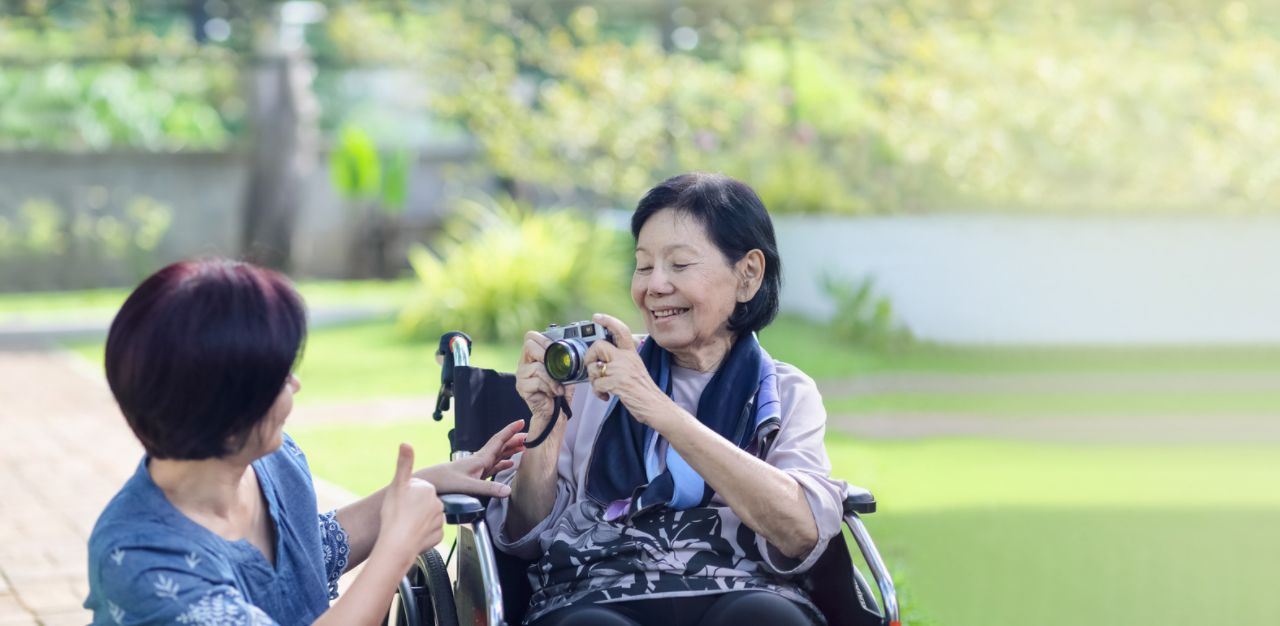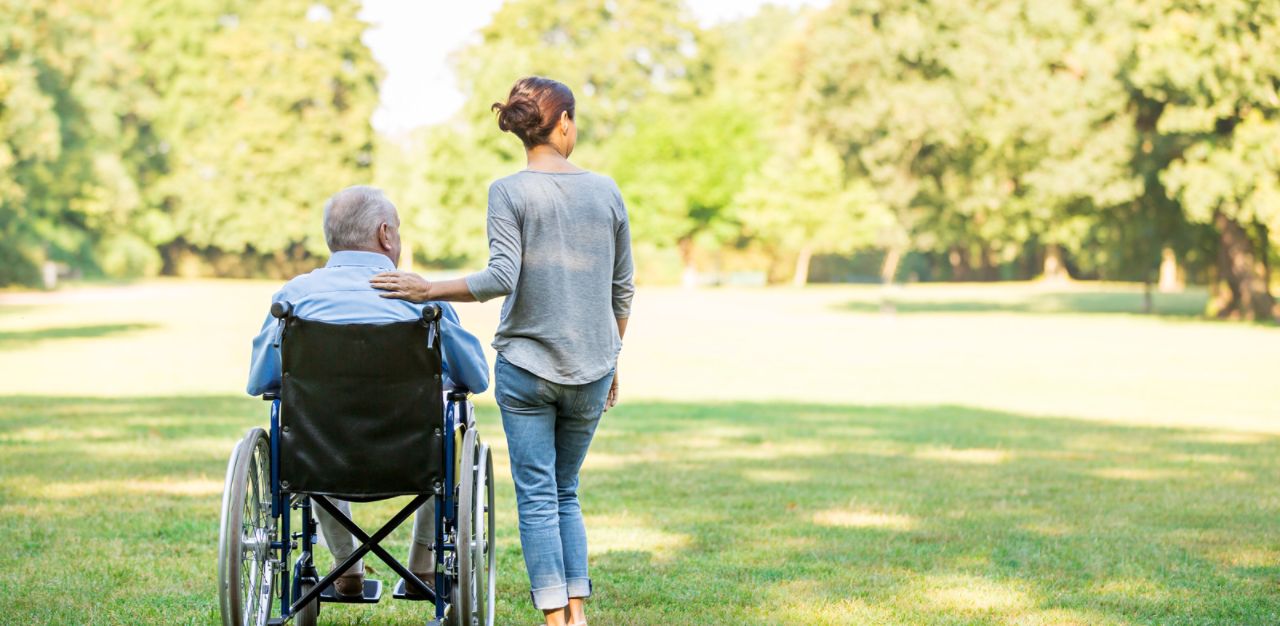Celebrated every November in the United States since 1997, National Family Caregivers Month recognises and honours family caregivers. While this is a special time to acknowledge all caregivers, it also offers an opportunity to raise awareness of caregiving issues, educate the community, and increase support for caregivers.
As the society ages rapidly, many in Singapore have taken on the role of caregivers for elderly parents, loved ones suffering from rare diseases or become full-time mums. It is estimated that there are more than 210,000 caregivers, many of whom have had to compromise careers, finances and even health.
It is no wonder that caregiving takes a significant toll on one’s emotions, finance and physical health and with nearly half of all caregivers being over the age of 50, many also suffer a decline in their own health. They have seen their stress levels climb to an all-time high during the Covid-19 pandemic, especially during the circuit breaker or whenever there was heightened alert when they had to spend 24/7 at home without any respite.
With the financial, physical, and emotional challenges that family caregivers face, it is ever more important that caregivers themselves receive some kind of care as well.
Stepping into the role of a family caregiver

A family caregiver is often an unpaid individual — a spouse or family member— who assists a senior with activities of daily living and/or medical tasks and has multiple responsibilities, working for twenty-four hours seven days a week.
Ms Jacinda Soh, Head of TOUCH Caregivers Support, says the daily routine primarily revolves around the needs of the care recipients, such as feeding, toileting and showering. She adds that with limited resources and a care support network, these caregivers shoulder work commitments, housework, cooking, and sending the loved ones to and from medical appointments.
Ms Soh says that in many instances, individuals become caregivers overnight or without prior warning and would have to quit their jobs to provide care for an elderly-sick at home. Financial concern is a primary cause of worry for many caregivers. They are usually unprepared, overwhelmed, and lack the mental capacity when they take on full-time caregiving, often ending up feeling frustrated and bitter.
“Without sufficient time to fully consider the long-term financial implications of their decision, and not knowing where to turn to for financial assistance, this concern often snowballs, particularly when the burdens of care increase, leaving them little time or energy to even seek help,” she says.
“This is especially so if the caregiver is the sole breadwinner of the family. For those who have their successful or high-flying career cut short, the additional loss of status not only leads to a loss of financial resources but also affects their sense of significance, leading to greater anxiety and stress, and possibly affecting their relationship with loved ones,” Ms Soh adds.
Apart from the financial pressures, Ms Soh says caregivers face challenges in accessing the right resources, often coming up against constraints when looking for placements at nursing homes for their loved ones or when employing the right domestic helpers. There is also that general sense of job insecurity when they need to drop everything at work to tend to the emergencies at home, or when they are being confined at home with their elderly loved one. These combined stressors can lead to anxiety and depression, as reflected in the calls received by the TOUCHCare line.
The COVID-19 pandemic and its restrictions have also made caregiving more overbearing and stressful as people get increasingly isolated by the unprecedented lockdown and disruptions caused to everyday life on all fronts – at work, home, and in school.
Ms Soh says that caregivers looking after elderly loved ones with dementia particularly face a harder time in helping them cope with the suspension of activities and comply with the ever-changing government guidelines on safe distancing and mask wearing. Having to manage vaccination, the loss of routine for the elderly, such as going down to the coffeeshop to chat with their friends, and the pressures of keeping them occupied, have driven stress levels of caregivers to an all-time high during this period.
When granny was no longer herself
Founder and Mindfulness Coach at Mindful Moments Singapore Erin Lee took care of her late grandmother who suffered from advanced dementia some years back. She had to juggle her own business, studied for her master’s program, and looked after her family all at the same time.
“My grandmother’s condition was serious and required a lot of care and attention 24/7. She was disoriented and anxious most of the time, and would scream and shout at the top of her voice throughout the day and night. It also didn’t help that she wouldn’t sleep at night because she feared she would die in her sleep. She constantly felt the need to get up and walk, which she was not allowed to because of the risk of falling, so we had to keep watch round the clock to make sure she was not trying to get up on her own,” she recalls.
“Since my grandmother became surprisingly strong and had extreme violent tendencies, every meal time and activity such as visiting the washroom required extra help. She was also constantly banging on tables and surfaces as a way to relieve her anxiety. We hardly got any sleep at night for those few years,” the mindfulness coach adds.
Ms Lee says it took her some time to accept the drastic changes that she witnessed in her grandmother – the changes in her personality and her inability to recognise family members.
“We had to manage her hysteria while keeping ourselves calm. Every day we questioned whether the big and small decisions we made, from what she ate to how much medication to administer, were really helping or kind to my grandmother,” she says.
Ms Lee also adds that as caregivers, they struggled with a range of emotions – from sadness about their plight, to anger and resentment towards their circumstances and guilt and shame from feeling like they were not doing enough. In those moments, there was a tendency to feel very alone and separated from the rest of the world.
“These were feelings of hopelessness because we didn’t know when it might end or if the situation would even improve, and we wondered how long we could sustain our present arrangements,” she adds.
When asked about the sacrifices she made to take on the caregiving duties, Ms Lee says that those duties were disruptive to her “usual way of life”, but she was fortunate not to have sacrificed her career because she was “blessed with circumstances and conditions that offered flexibility, as well as timely support and resources from family and friends, healthcare professionals, and government agencies”.
“Of course, if I didn’t take on the role of a caregiver, I might have been able to devote more time and attention to developing my work, but this is not an “either … or” situation. Taking care of my family is as much a priority as my work,” she adds.
Ms Lee also says that her family was advised to send her grandmother to a dementia care facility, and while they were grateful for the option, they decided against it as they felt that their grandmother would be more comfortable at home, surrounded by and with her loved ones tending to her. They were fortunate that they could also afford to hire a helper, and have the family work together as a team by taking on different roles and responsibilities and working in shifts.
Caregiving: Not limited to just women

There is the common perception that family caregivers are women. Many people still do not realise that a significant number of caregivers are men, and relatively little is known about the caregiving experiences of male caregivers vis-à-vis female caregivers.
Dr Thang Leng Leng, co-investigator of the research study “Caregiving Experiences of Male Caregivers of Dementia Patients” by the Next Age Institute (National University of Singapore) and Fei Yue Community services, says that studies tend to concentrate on female caregivers and it is easier to find them because there are many of them. This is because caregiving is mostly perceived as a gendered task, Dr Thang says.
But she also realises that there are single men who care for their aging parents. Among the dementia clients served by Fei Yue Community Services’ Community Mental Health (CMH), about 3 in 10 of the caregivers are men while the rest are women, as of April 2020.
Issues that men face when they need to care for their mothers in very intimate ways such as bathing also surfaced, which brought more attention to this subgroup of caregivers and the specific challenges they face.
“Men face challenges that are a bit different from women, which is why we thought we could have a more focused-look on male caregivers,” the Associate Professor at National University of Singapore says.
As gender stereotypes are rooted in caregiving, men may experience caregiving differently from women. Dr Thang says men might see themselves as more involved with aspects of planning and execution, while women may be more emotional in their approach.
“Sometimes, we wonder if men feel like they don’t have much emotional support to look to, since they are less likely to want to go to a support group. That could mean that they could be more stressed but they don’t have an outlet,” Dr Thang says.
“There’s a need to create more awareness to understand the diversity among caregivers and to know that male caregivers may have a different set of challenges,” she adds.
Filling the gap in caregiving

During the Budget debate in March, five Members of Parliament (MPs) raised issues about how caregivers in Singapore frequently experience burnout and struggle with mental and physical health issues.
In February, Ms Carrie Tan, an MP for Nee Soon, asked the Ministry of Manpower (MOM) to consider a new financial scheme for full-time caregivers, which she called the CareFare Income Supplement. This scheme aims to supplement full-time caregivers’ income and retirement savings.
Separately, Mr Melvin Yong, an MP for Radin Mas, asked if MOM would consider incentivising employers to allow employees with caregiving duties to work remotely, so that they can better manage both work and caregiving responsibilities at home.
Caregivers’ plight is not overlooked and is still a recurring theme during Parliamentary sittings in recent years. The government has also ramped up its support for caregivers through its various schemes. However, there remains gaps to be plugged.
In an article published on The Straits Times, Ms Shailey Hingorani, head of advocacy and research for the Association of Women for Action and Research (AWARE), said that access to clear information remains a challenge and barriers in accessing formal care services still exist.
Illustrating from AWARE’s report, Ms Hingorani said caregivers often shared their frustrations when navigating the current landscape of services, which was found to be “extremely fragmented”. She also said for caregivers trying to find the best service for their care recipient, the onus is on them to seek out all available services and try to do a cost-benefit analysis on what works best for their situation — but there is no existing platform that compiles information on all types of services and providers.
At TOUCH Community Services, Ms Soh says that from their experience working with caregivers in the past two decades, accessibility to resources still remains a challenge. She adds that during the pandemic, caregivers not only need more support in managing issues at home but also to explore available care options.
“Some of the concerns we have come across on our Care Line during this pandemic include the limited availability of care options due to restrictions and constraints brought about by the crisis, leading to increased anxiety faced by caregivers. For example, many caregivers face difficulties employing domestic helpers due to the higher cost and travel restrictions. They also shared about the long waiting list for subsidised elder-sitting services, day care centres and nursing homes. In such situations, caregivers looked to employers to grant more flexible working arrangements or support access to services,” she says.
To increase awareness and accessibility to resources, TOUCH Community Services provide training to caregivers at home and update them on resources available in the community and direct them to where they can go for help. They have also created a caregivers support group on Facebook, which is a closed group for caregivers where they explore solutions and also receive affirmation from other caregivers. Ms Soh affirms the importance of strengthening informal and formal networks of care.
“This pandemic also showed the importance of community or neighbourhood care networks. During the circuit breaker, we saw how residents or neighbours took the initiative to reach out to vulnerable caregivers, the isolated or frail seniors in their midst,” she says.
“[Strengthening informal networks of care] is one way to increase the number of community assets, to increase knowledge, and equip residents to address caregiving issues,” she adds.
The importance of self-care for caregivers

Caregivers who do their best to take care of others often neglect their own wellbeing. They might feel inclined to continue providing for the ones they love even when their own bodies and minds need rest. Feeling like they are not doing enough or beating themselves up over what they could or should have done are also common emotional and mental stresses for family caregivers. This is what is referred to as “caregiver burnout” or “compassion fatigue”.
One of the ways caregivers can take care of themselves is through mindfulness practice. Ms Lee says that it has taught her the importance of keeping a gentle watch over herself so that she does not suffer burnout or break down easily. It has helped her let go of some struggles by accepting reality, become a more resilient person, and finding more emotional balance through the cultivation of non-judgmental awareness and kindness towards herself.
While it is important for a caregiver to be compassionate towards who we are looking after, they must also practice self-compassion. Only when they learn to take good care of themselves are they able to better care for others, she says.
“Pay more attention to your own mind and body – this is the greatest gift you could award yourself and the people you are caring for. In addition, know that you are not alone, and your struggles are a part of the common humanity. When we realise how interconnected we all are with one another, it becomes easier for us to ask for help, and to accept help. Last but not least, know that you deserve care and concern as much as anybody else.”
Join the conversations on TheHomeGround Asia’s Facebook and Instagram, and get the latest updates via Telegram.




























